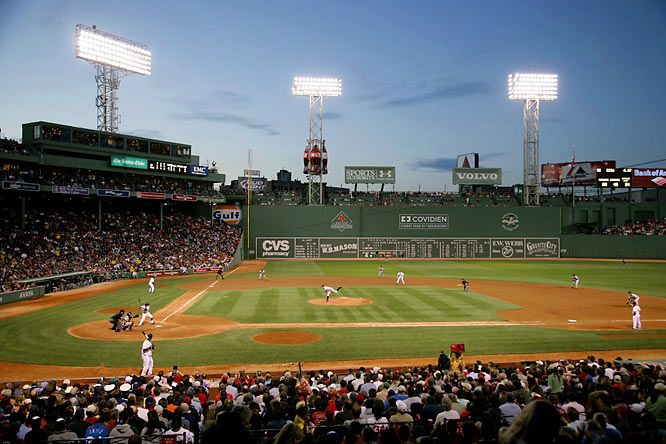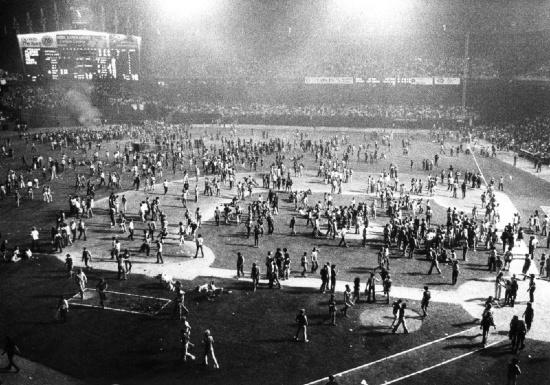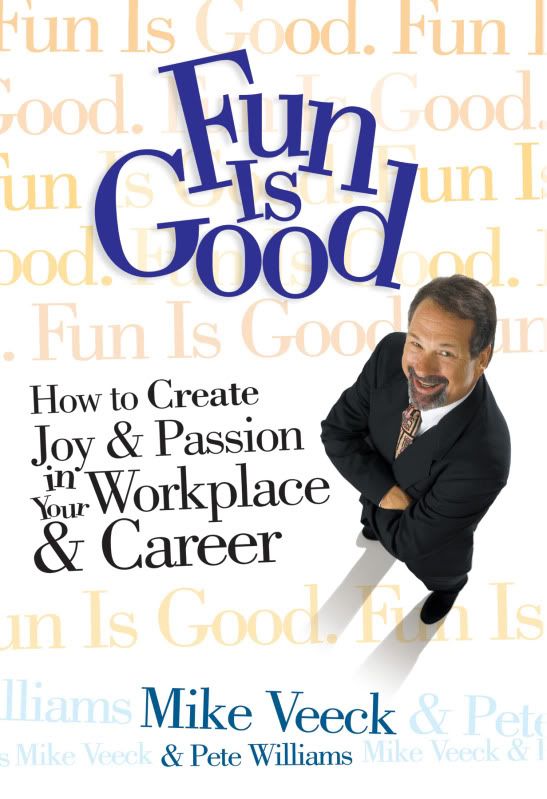Back to the Garden...
Used to be, baseball was just a game. Honus Wagner, Babe Ruth, Lefty Grove, you could name any of the greats who played before the the 1960s - they understood they were lucky men, paid real cash to play a kid's game. They played ball, and they were on the radio, and boys and men loved them...but it was pretty well understood that baseball was not for deep thinkers.
As late as the 1950s college men were rare in baseball. Jim Brosnan, one such rarity, penned The Long Season, an account of his 1959 tour as a pitcher with the St. Louis Cardinals and the Cincinnati Reds. Both it and the sequel, Pennant Race, remain among the best baseball books ever written...but they are well-crafted diaries, not to be mistaken for serious literature.
Nor did they aspire to be. In 1959 baseball was still light entertainment. A preeminent aspect of American culture, to be sure - 'the national pastime' - but nothing complicated. A baseball game was a good way to kill an afternoon, not a metaphor for tragicomic America or a portal to enlightenment.
That all began to change in the 60s and 70s, as a new generation of writers reinvented baseball journalism. In 1960
Fenway Park, in Boston, is a lyric little bandbox of a ballpark. Everything is painted green and seems in curiously sharp focus, like the inside of an old-fashioned peeping-type Easter egg. It was built in 1912 and rebuilt in 1934, and offers, as do most Boston artifacts, a compromise between Man's Euclidean determinations and Nature's beguiling irregularities...

Updike made his mark, to be sure. But it wasn't until the early 70's that the stakes really started to rise. Two books appeared in 1972 that have stood the test of time: Roger Kahn's The Boys of Summer and Roger Angell's The Summer Game. Carefully researched and well-written, they showed how much the average baseball writer was leaving on the table.
Apart from their quality, the two books didn't have much in common. Kahn's was a meditation on the meaning of the Brooklyn Dodgers, Angell's a mosaic-like series of essays written (originally for The New Yorker) over ten years' time. Angell, the stepson of E.B. White, might have been the better writer. Kahn probably had the better story. But both books demonstrated that you didn't have to just write about baseball. You could use baseball to write about other things...big things.
The effect was compable to Messner's "fair means" solo climbs of the era: no one could do it the old way and claim to be top-of class anymore. Both books sold well and long. Literary agents began scanning alertly for baseball writers who could actually write.
The floodgates opened. Literary types were suddenly free to write about baseball without fear of ridicule. Sportswriters, often derided as hacks, could aim higher and gain recognition for their intellectual gifts. One of the best, Thomas Boswell, named his 1983 collection of essays How Life Imitates the World Series. He got away with it because it was a good book. So was the sequel, Why Time Begins on Opening Day.
(A good anthology of 'literary' baseball essays is here.)
Well, what wise men do in the beginning, fools do in the end. Suddenly, people who knew little about baseball and were perhaps not in the same league as Updike, Kahn, and Angell, decided they could write baseball literature, too. The field grew more crowded, and the conversation slipped from the summit, descended some distance, bounced off George Will and David Halberstam, then descended further (if that were possible) into weighty, philosophical, ponderous, incoherence.
Which reminds me of a little joke.
An Englishman, an American, and Bob Costas have been taken prisoner in a Latin American dictatorship, and are to be executed. They are offered the opportunity to say a few words before the firing squad does its work.
The Englishman steps up and says "I am sorry that I can only die once for Her Majesty, and urge you to consider a more progressive form of government."
Thanks, they say, and then kill him.
Then they turn their attention to Bob Costas. Costas says "I'd like to make a few remarks about what baseball has meant to the American spirit, and how inspiring the great players of the 1950s..."
"Excuse me...!" says the American. "Would you mind shooting me first?"
Baseball's intellectual pretension index may have peaked with the appointment of A. Bartlett Giamatti as Commissioner in 1989. For the literary fan, it was as great a triumph as could be hoped for. A former professor of Comparative Literature and president of Yale, Giamatti was, for his short tenure, the thinking man's Commissioner.

"It breaks your heart. It is designed to break your heart. The game begins in the spring, when everything else begins again, and it blossoms in the summer, filling the afternoons and evenings, and then as soon as the chill rains come, it stops and leaves you to face the fall alone."
It looked like an opportunity to redeem a sport that sometimes seemed to be veering out of control. In the preceding ten years baseball had seen farcical events like the White Sox' infamous Disco Demolition promotion and the Pine Tar Incident, not to mention a crippling strike in 1981 and the Pete Rose gambling scandal.
The effect was cumulative, but in those days, if you were tracing the decline and fall of baseball, you would probably have to start with the events of Disco Demolition Night. The brainchild of Steve Dahl and White Sox executive Mike Veeck, it seemed like a good idea at the time.
The Sox had a doubleheader at Comiskey against the Tigers. Drawing about 6,000 per game, they decided to offer $0.98 admission to anyone who brought a disco record to the game to be destroyed. Between games they'd put all the records in a box in center field and blow it up. They figured they'd double their usual crowd, maybe pull in 12,000.
Weren't they surprised when 90,000 people, almost double the stadium's capacity, showed up. Things got a little out of hand. Folks started climbing in over the walls, and smoking marijuana, and throwing their disco records from the stands. The Sox and Tigers did manage to finish the first game (4-1 Tigers, Pat Underwood got the win with a fine performance).
Before the second game they blew up the records in center field, and that made a big hole in the grass, and then a couple thousand fans rushed the field and destroyed a batting cage, and set stuff on fire, and all the bases disappeared, and the riot police had to be called in, and you can see how this sort of thing gets blown up out of proportion on a slow news day.

A faceless bureaucrat forfeited the second game, something that has not happened in the American League in the 30 years since. No fool, Veeck knew he was out of major league baseball. "The second that first guy shimmied down the outfield wall, I knew my life was over!"
(Olbermann recaps here.)
But Disco Demolition Night was just one manifestation of the underlying problems. Too much weird stuff was happening, and baseball just wasn't living up to the somber luster the literary journalists had imbued it with. Perhaps, if Giamatti had lived, he could have "restored the honor and dignity of the game," and prevented some of what came after. But he was dead after less than six months in office, his demise hastened, some said, by the stress of the Rose affair. The Steroid Era was just around the corner.
I loved Giamatti and what he stood for. His untimely passing still hurts a little. He seemed like a genuinely nice guy who cared for the game and understood that it was beautiful. But as I get older, I realize I simply cannot agree with him about the meaning of baseball.
I became a fan when baseball was still light entertainment, and with that comes the expectation that watching it will be, on average, fun. Yes, a smart person can make it deep. But a smart person can make tennis deep, too, or golf, or building a house, or eating oatmeal. Baseball itself is not all that deep. Just as Shakespeare was a playwright, and the Beatles were a band...baseball is a game. And in the first instance, games are meant to be fun. Over the past 20 years, between the money and the drugs and the strikes...baseball wasn't as much fun as it could have been.
I mean, Major League baseball...you can still have fun at a minor league game. It wasn't a tough decision during our family vacation a few weeks ago to skip the Minnesota Twins and their airless, grassless venue, and go across the river to watch the Saint Paul Saints at Midway Stadium.

It is a lyric little bandbox of a ballpark. Everything is painted green and seems in curiously sharp focus, like the inside of an old-fashioned peeping-type Easter egg. It was built in 1982 and rebuilt in 1995, and offers, as do most Minnesotan artifacts, a compromise between Man's Euclidean determinations and Nature's beguiling irregularities
We had a wonderful time, along with about 6,000 other fans. The Saints keep it family-friendly, and I never had to worry about some drunk screaming obscenities or starting a fight next to my young kids (one reason we haven't been to a Giants game this year). The Saints (team motto: "Fun is Good") have 'ushertainers' in costume walking through the crowd, and a PA announcer who gently mocks the other team by pretending to doze off as he introduces their cleanup man. Between innings they have silly contests and karaoke, and practice random acts of kindness. Plus, we all got St. Paul Saints wiffle-ball bats.
Frankly, I was won over before the game started. I don't think I've ever done this - I went down to the souvenir stand and bought a team hat.
The Saints play good baseball, too. They are not affiliated with a major league club, but their level is, to my eyes, high AA, and some of their players have gone on to careers in the majors. Squaring off against the Sioux City Explorers they executed well, played heads-up ball, and showed Sioux City what a St. Paul fastball looks like.

I had not known until recently that Updike had, in his later years, revisited his 1960 essay. "The crowd and Ted had always shared what was important," he wrote - "a belief that this boys' game terrifically mattered."
Updike was wrong, too. The game hardly matters. The things around the game - the fathers and sons, the laughter, the shared joy and sadness - those are the things that matter. It's not that baseball teaches us about life, or is a metaphor for human destiny. It is part of life, and a chance to have good fun. That's what matters.
Ask Mike Veeck, the owner of the St. Paul Saints.



1 Comments:
The last baseball game I went to, long ago was the Mariners, losing of course. I was left with the sense of an enormous corporate exercise designed masterfully as a cash extraction system, with the exception of Edgar Martinez (yes that far back) who somehow played with heart and projected it to the stands.
The last game I really enjoyed was an Anchorage Glacier Pilots game, on a June night, out in the air, chatting with friends over beer; and every so often something really impressive would happen- I'm not really a fan but that was baseball, man.
Post a Comment
<< Home